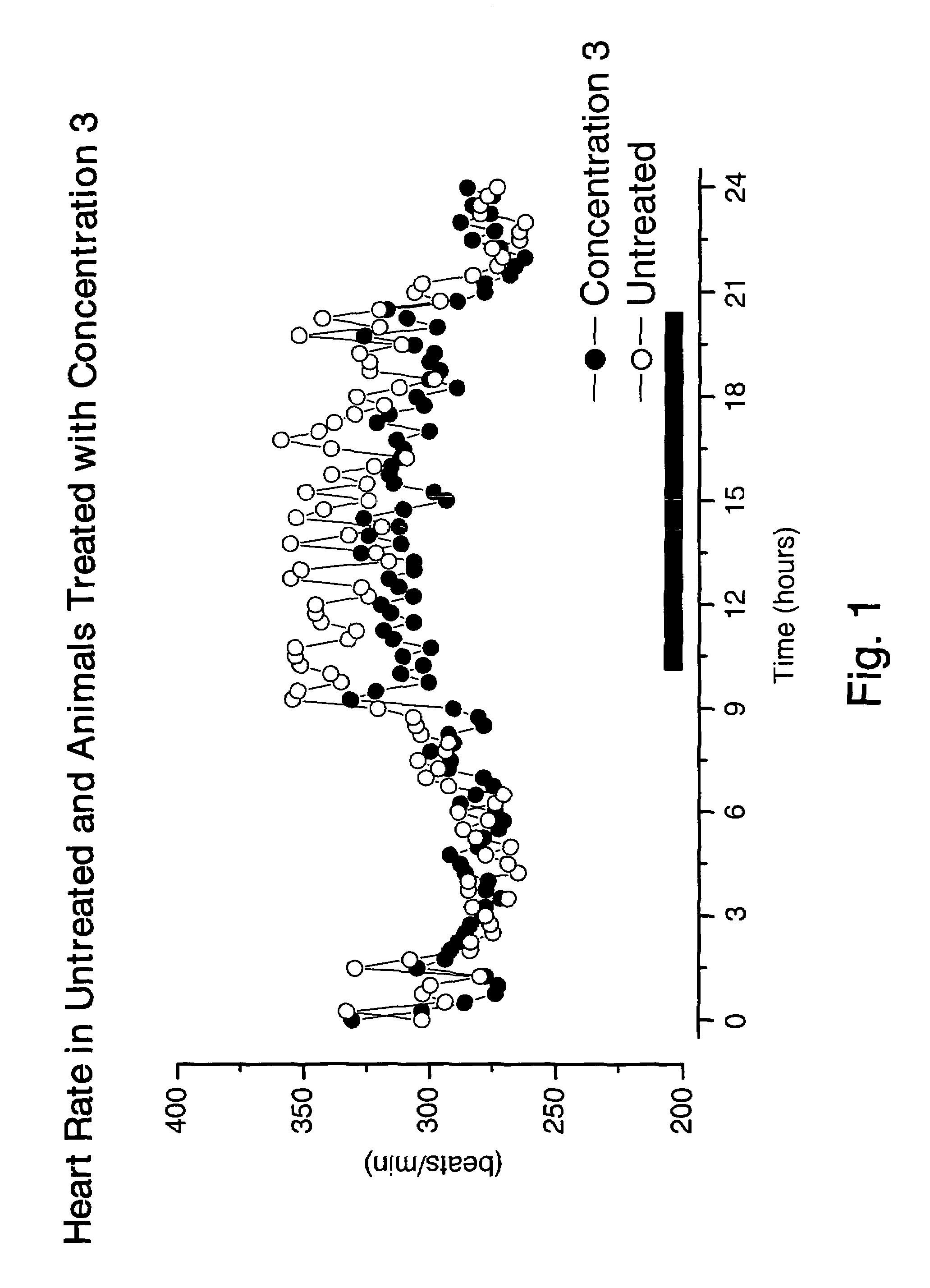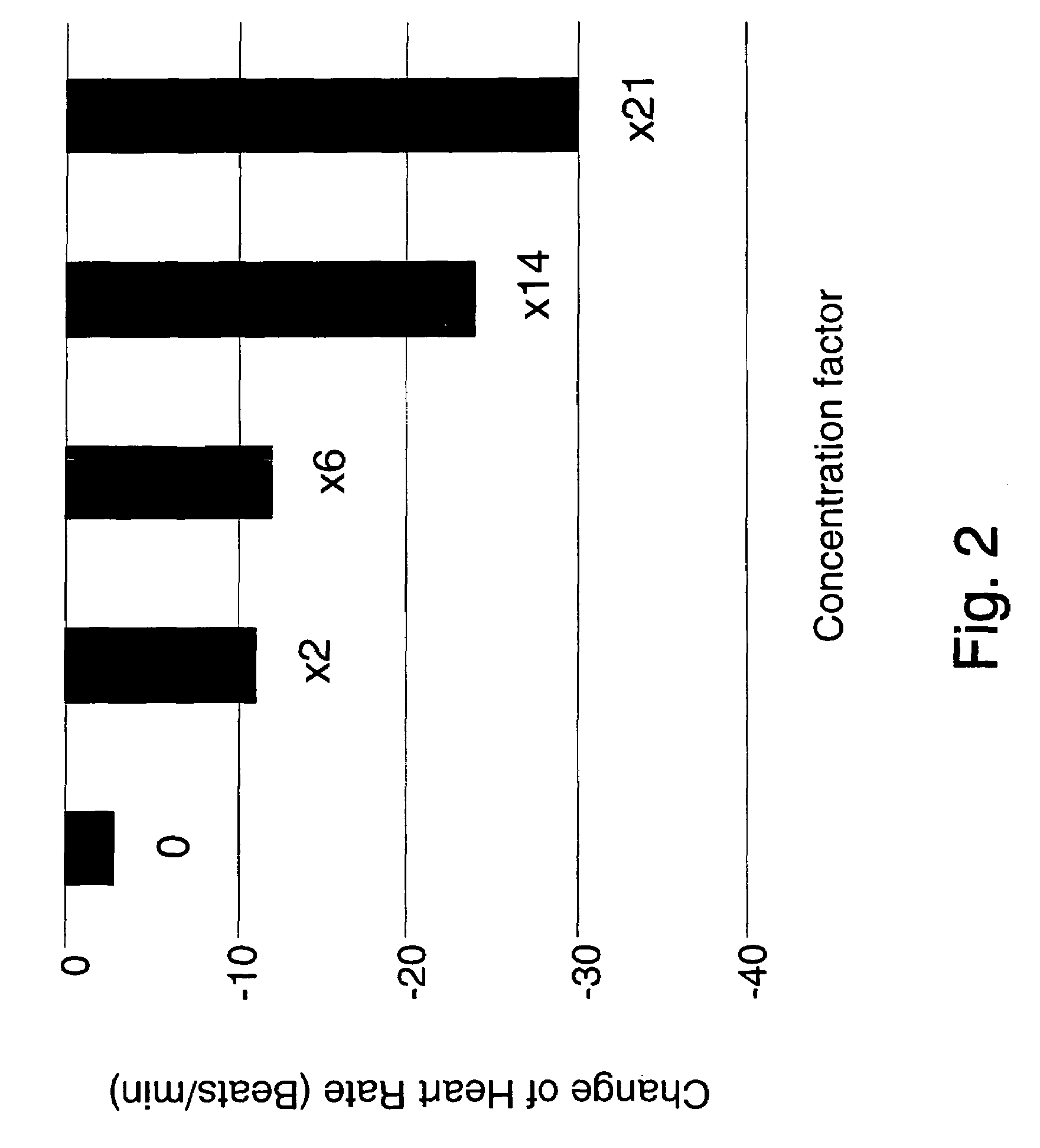Reducing heart rate in mammals using milk derived fermentation products produced using Lactobacillus helveticus
a technology of lactobacillus helveticus and fermentation products, which is applied in the field of reducing heart rate in mammals using milk derived fermentation products produced using lactobacillus helveticus, can solve the problems of increasing ischemic risk and affecting ventricular function, and achieve the effect of reducing heart ra
- Summary
- Abstract
- Description
- Claims
- Application Information
AI Technical Summary
Benefits of technology
Problems solved by technology
Method used
Image
Examples
example 1
In Vivo Test of Heart Rate Reducing Properties
Materials and Methods
Strains and Cultivation
[0222]Strains were streaked on MRS agar and incubated anaerobically for 48 h at 37° C. A single colony was picked, inoculated into MRS broth and grown overnight at 37° C. Stock cultures were prepared from this overnight culture and were stored at −80° C. in 20% glycerol. The strains were precultivated in milk overnight and inoculated 1% (v / v) in fresh milk for the fermentation.
Preparation of the Samples
Whey: Sample 1
[0223]The milk (9.5% of protein content) was fermented with the strain of single culture for 16 hours with an inoculation level of 1% (v / v). The fermented product was centrifuged, the pellet was discarded and the whey was filtered through a 0,45 mm filter and freeze-dried. A second fermentation, fermented under the same conditions as the first one, was centrifuged and the whey fraction obtained. The pellet was discarded and the whey was filtered through a 0,45 mm filter and frozen. ...
example 2
PCR Amplification Reaction
[0253]Template DNA was obtained by phenol-chloroform extraction as previously described (Marmur (1961, Journal of Molecular Biology, 3, 208-218). The final preparation was genomic template DNA in a TE buffer+RNAse.
[0254]The PCR reaction was prepared as follows:[0255](i) 1.0 μl of template DNA[0256]1.0 μl of forward primer (5 pmol / μl)[0257]1.0 μl of reverse primer (5 pmol / μl)[0258]1.0 μl 2.5 mM dNTD (mixture of dATP, dCTP, dGTP, dTTP)[0259]5.0 μl Mg buffer (20 mM MgSO4)[0260]0.5 μl DNA polymerase (Pwo, 100 U)[0261]10.5 μl H2O[0262](ii) The thermal program for the PCR amplification was 30 cycles of 1 min at 94° C., 90 s at 50° C. (when primers Tm was around 55° C.), 90 s at 55° C. (when primers Tm was around 62° C.), 90 s at 45° C. (when primers Tm was around 50° C.) and 1 min at 72° C. The samples were cooled to 4° C. after the 30 cycles were completed.[0263](iii) The PCR products were run on a 1.5% agarose gel at 60 V, excised from the gel under UV light an...
example 3
Proteolytic (ACE) Activity Assay
Preparation of Stock Culture
[0264]Lactobacillus species were streaked on MRS agar and incubated anaerobically for 48 h at 37° C. A single colony was picked, inoculated into MRS broth and grown overnight at 37° C. Lactococcus species were streaked on M17 agar and incubated aerobically for 48 h at 30° C. A single colony was picked, inoculated into M17 broth and grown overnight at 30° C. Stock cultures were prepared from these overnight cultures and were stored at −80° C. in 20% glycerol.
Preparation of Fermented Milk and Extraction of Peptides or Other Active Components
[0265]Fermentation is performed by inoculate 200 ml of fresh milk with an overnight stock culture of example 1 (1% v / v) and maintain overnight at 37° C. or 30° C. dependent on the strain used.
[0266]From the fermented milk, extraction of the peptides or other active components may be achieved by using the following protocol:[0267]Centrifuge at 3000 g for 10 min at room temperature.[0268]Wit...
PUM
| Property | Measurement | Unit |
|---|---|---|
| temperature | aaaaa | aaaaa |
| temperature | aaaaa | aaaaa |
| incubation time | aaaaa | aaaaa |
Abstract
Description
Claims
Application Information
 Login to View More
Login to View More - R&D
- Intellectual Property
- Life Sciences
- Materials
- Tech Scout
- Unparalleled Data Quality
- Higher Quality Content
- 60% Fewer Hallucinations
Browse by: Latest US Patents, China's latest patents, Technical Efficacy Thesaurus, Application Domain, Technology Topic, Popular Technical Reports.
© 2025 PatSnap. All rights reserved.Legal|Privacy policy|Modern Slavery Act Transparency Statement|Sitemap|About US| Contact US: help@patsnap.com



